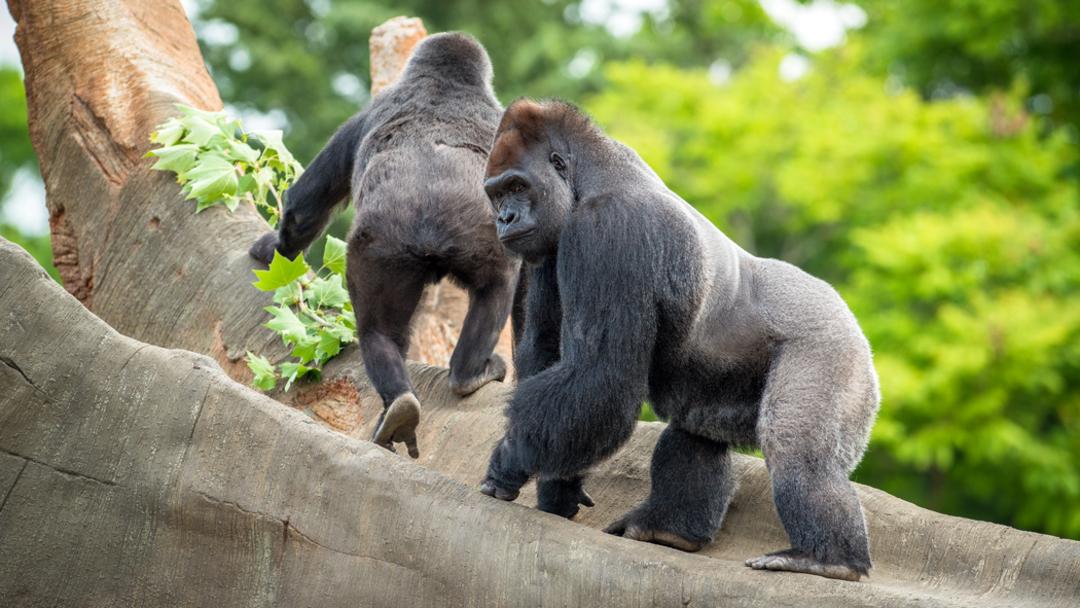We recently chatted with Houston Zoo's Primate Supervisor Jill Moyse about the new gorilla exhibit. If you couldn't join in the conversation, don't panic! You can read all about it here.
Q: What has been the most surprising part of being a primate supervisor?
A: I'm really excited about working with all the different primates here at the Houston Zoo that I haven't been able to work with in the past. For instance, the sifaka lemur is fascinating and they surprise me every day!
Q: Do the gorillas share their environment with any other animals, and why?
A: Yes Lauren! The gorillas share the space with three red river hogs, one male and two females. These two species share the forest in Africa, so it's perfectly natural for them to live together here.
Q: How many gorillas do you have right now and do you have a plan to add any more?
A: We have 7 gorillas that live in two separate groups. It is very likely that we'll get more in the future, since we have a fantastic, great big space!
Q: What is a "Day in the Life" like as a Primate Supervisor?
A: Every day is so different, but we usually start with a morning meeting so all 23 staff members are on the same page. The keepers then split to our different areas of the zoo to work with their animals and I visit with individuals to make sure they're ready for the day. The rest of my day is spent working with the different departments of the zoo from our facilities team, PR director or giving tours to donors. I also make sure to spend part of my day with our amazing new gorillas. That is the best part of my day!
Q: What's something to look for when I go and visit them at the zoo?
A: This summer, as a part of our event Chill Out presented by TXU Energy - our gorillas get ice pops every day at 3 p.m. They seem to love this enriching way to beat the summer heat!
Q: Why are gorillas endangered and what can we do to help?
A: Great question, Annie! Gorillas are endangered for many reasons. From human encroachment to deforestation. The Houston Zoo is proud to partner with several organizations in Africa that help save gorillas in the wild. Additionally, Houstonians can play a big part in their survival by simply visiting the Houston Zoo and recycling their cell phones (or any small handheld device). Inside these devices is a mineral that is mined from the forests in Africa where the gorillas live. Tantalum can be reused, if people simply recycle! So next time you visit, empty your junk drawer and bring us your old discarded cell phones to help save gorillas in the wild.
Q: What Do you think, the Gorillas feel about all people that come to see them every day?? Keep up the good work.
A: Thank you! Since all of these gorillas were born in zoos, they are quite used to seeing people. They are certainly interested in seeing what's going on around them.
Q: What got you into this...working with these awesome animals?
A: I've had a life-long love of animals, and when I first fed a gorilla as a keeper at Lincoln Park Zoo, it was love at first bite.
Q: What creative items or things do you do for enrichment throughout the week?
A: We provide the gorillas with manipulative enrichment items - things that really get them working and thinking. For instance, we take boomer balls (large, heavy plastic) fill them with treats or jello, then they gorillas have to work to get the treats out.
Q: What is the average life span or a gorilla?
A: Currently the oldest gorilla living at an AZA-zoo is Colo at Columbus Zoo. She is 58 years old!
Q: What time of day are the gorillas most active?
A: They are most active between 9-10 a.m. when they first come out into the yard for the day. Since they are large, muscular vegetarians, they do a lot of eating and resting - especially during the hottest parts of the day. If you don't see them at first, look for the shady spots and be patient! They'll get moving soon enough.
Q: What are some of the surprising foods the gorillas enjoy as part of their diet? Anything exotic?
A: They are vegetarians which is surprising to some people! Because of our climate here in Houston, we're able to give them a wide variety of browse (tree limbs & branches) to munch on throughout the day.
Q: How old is your oldest gorilla... and how young is the youngest?!
A: Our oldest is Binti, and she's 40. Sufi is 13 and our youngest.
Q: What's one of the funniest experiences you've had while working with the primates?
A: All of our gorillas have great personalities that it's hard to pick just one!
Q: Which one of the gorillas is more 'talkative'?
A: Gorillas are surprisingly quiet, Debra. They do vocalize sporadically throughout the day, so I can't say that one is more talkative than another.
Q: How do you communicate with the gorillas?
A: Gorillas participate in daily training sessions where we ask them to do different behaviors through verbal and hand cues. By participating in this training we are able to build a relationship with the individual gorilla and give them an overall health check.
To learn more about our gorillas, visit www.houstonzoo.org/explore/animals/western-lowland-gorilla.





